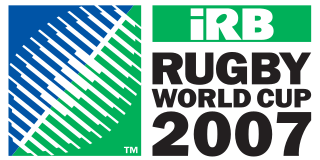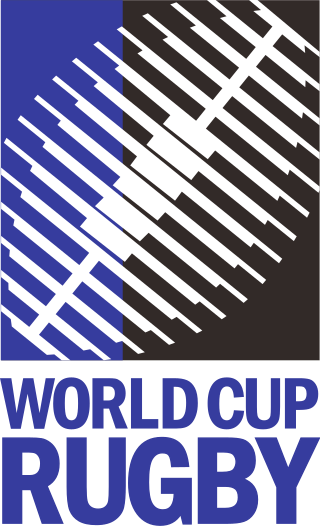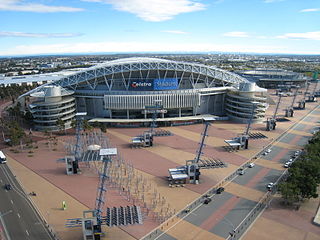
The Rugby World Cup is a men's rugby union tournament contested every four years between the top international teams, the winners of which are recognised as the World champions of the sport.

The 1999 Rugby World Cup, was the fourth Rugby World Cup, the quadrennial international rugby union championship, the first World Cup to be held in the sport's professional era.

The 2007 Rugby World Cup was the sixth Rugby World Cup, a quadrennial international rugby union competition organised by the International Rugby Board. Twenty nations competed for the Webb Ellis Cup in the tournament, which was hosted by France from 7 September to 20 October. France won the hosting rights in 2003, beating a bid from England. The competition consisted of 48 matches over 44 days; 42 matches were played in 10 cities throughout France, as well as four in Cardiff, Wales, and two in Edinburgh, Scotland.

The 1987 Rugby World Cup was the first Rugby World Cup. It was co-hosted by New Zealand and Australia – New Zealand hosted 21 matches while Australia hosted 11 matches. The tournament was won by New Zealand, who were the strong favourites and won all their matches comfortably. New Zealand defeated France 29–9 in the final at Eden Park in Auckland. The New Zealand team was captained by David Kirk and included such rugby greats as Sean Fitzpatrick, John Kirwan, Grant Fox and Michael Jones. Wales finished third, and Australia fourth, after conceding crucial tries in the dying seconds of both their semi-final against France and the third-place play-off against Wales.

Jonathan Peter Wilkinson, is an English former rugby union player. A fly-half, he played for Newcastle Falcons and French side Toulon and represented England and the British & Irish Lions. He is particularly known for scoring the winning drop goal in the 2003 Rugby World Cup Final and is widely acknowledged as one of the best rugby union players of all time.

The Australia national rugby union team, nicknamed the Wallabies, is the representative national team in the sport of rugby union for the nation of Australia. The team first played at Sydney in 1899, winning their first test match against the touring British Isles team.

The 1991 Rugby World Cup was the second edition of the Rugby World Cup, and was jointly hosted by England, Scotland, Wales, Ireland and France: at the time, the five European countries who participated in the Five Nations Championship. This was the first Rugby World Cup to be staged in the northern hemisphere, with England the hosts of the final. Also for the first time, qualifying competitions were introduced as the number of entrants had increased from 16 nations four years before to a total of 33 countries. The eight quarter-finalists from 1987 qualified automatically with the remaining eight spots contested through qualifiers by 25 countries. This resulted in only one new side qualifying for the tournament, Western Samoa replacing Tonga. The same 16-team pool/knock-out format was used with just minor changes to the points system. South Africa was again not included because of sanctions imposed on the country by the IRB, due to the government's apartheid policies.

The 2003 Rugby World Cup Final was the final match of the 2003 Rugby World Cup, the fifth edition of the Rugby World Cup competition organised by the International Rugby Board (IRB) for national rugby union teams. The match was played at Stadium Australia in Sydney on 22 November 2003, and was contested by Australia and England. The 20-team competition consisted of a group stage, from which eight squads qualified for the knockout stage. En route to the final, Australia finished first in Pool A with four wins and no losses or draws before defeating Scotland in the quarter-final and New Zealand in the semi-final. England finished on top of Pool C and, like Australia, went undefeated with four victories and no draws before beating Wales in the quarter-final and France in the semi-final.

The 2007 Rugby World Cup final was a rugby union match, played on Saturday, 20 October 2007 at the Stade de France, Saint-Denis, Paris, to determine the winner of the 2007 Rugby World Cup. South Africa beat England 15–6. Having also won the 1995 tournament, South Africa became the second country to win two World Cups, following Australia, who won in 1991 and 1999.

The 2014 Women's Rugby World Cup was the seventh edition of the Women's Rugby World Cup, and the sixth held in Europe. The World Cup Final took place on 17 August.

The 2003 Rugby World Cup was the fifth Rugby World Cup and was won by England. Originally planned to be co-hosted by Australia and New Zealand, all games were shifted to Australia following a contractual dispute over ground signage rights between the New Zealand Rugby Union and Rugby World Cup Limited. The pre-event favourites were England, regarded by many at the time as the best team in the world. New Zealand, France, South Africa and defending champions Australia were also expected to make strong showings, with New Zealand being second favourites after victory in the southern-hemisphere Tri-Nations championship.
The knockout stage of the 2015 Rugby World Cup began on 17 October with two quarter-finals and concluded on 31 October with the final at Twickenham Stadium in London with all matches played over the course of three consecutive weekends.

The European Rugby Champions Cup is an annual rugby union tournament organised by European Professional Club Rugby (EPCR). It is the top-tier competition for clubs who compete in a predominantly European league. Clubs qualify for the Champions Cup via their final positions in their respective national/regional leagues or via winning the second-tier Challenge Cup; those that do not qualify are instead eligible to compete in the second-tier Challenge Cup.
Of the twenty-four nations involved in 1993 Rugby World Cup Sevens, nineteen were invited and five had to go through pre-tournament 1993 Rugby World Cup Sevens qualifying. Four of the qualification places were won by Namibia, Hong Kong, Taiwan and Spain who booked their places by reaching the semi-finals of one qualifying event in Sicily. Latvia won their place by beating Russia in the final of a mini-tournament staged in Moscow to decide who would replace the USSR, which had broken up since its invite to the world cup.
Pool D of the 2019 Rugby World Cup began on 21 September 2019. The pool included 2015 runners-up and quarter-finalists Australia and Wales. They were joined by Georgia, who automatically qualified for the first ever time. They were joined by regional qualifiers from the Americas, Uruguay (Americas 2), and Oceania, Fiji (Oceania 1).
The knockout stage of the 2019 Rugby World Cup began on 19 October and concluded on 2 November with the final at the International Stadium Yokohama in Yokohama, Japan.
The 2019 Hong Kong Sevens was a rugby sevens tournament that took place at the Hong Kong Stadium between the 5–7 April 2019. It was the 44th edition of the Hong Kong Sevens, and the seventh tournament of the 2018–19 World Rugby Sevens Series. Sixteen teams competed in the main tournament, while a further twelve competed in a qualifier tournament with the winner getting core team status for the 2019–20 World Rugby Sevens Series.
The 2001 Cardiff Sevens was an rugby sevens tournament that took place at the Rodney Parade with the finals being held at the Millennium Stadium. It took place between 2–3 June 2001 and was the first edition of the Cardiff Sevens and the final round of the 2000–01 World Sevens Series.
Pool D of the 2023 Rugby World Cup began on 9 September 2023 and concluded on 8 October 2023. The pool included 2003 champions and 2019 runner-ups England, previous hosts Japan, and Argentina. They are joined by Samoa, the winner of the Oceania 1 qualifier, and tournament debutants Chile. England topped the group and Argentina placed second, thus allowing both teams to progress.
The knockout stage of the 2023 Rugby World Cup is the second and final stage of the competition, following the pool stage. Played from 14 to 28 October, the knockout stage will end with the final, held at Stade de France in Saint-Denis. The top two teams from each pool advanced to the knockout stage to compete in a single-elimination tournament. There will be 8 matches in the knockout stage, including a third-place play-off played between the two losing teams of the semi-finals.



















